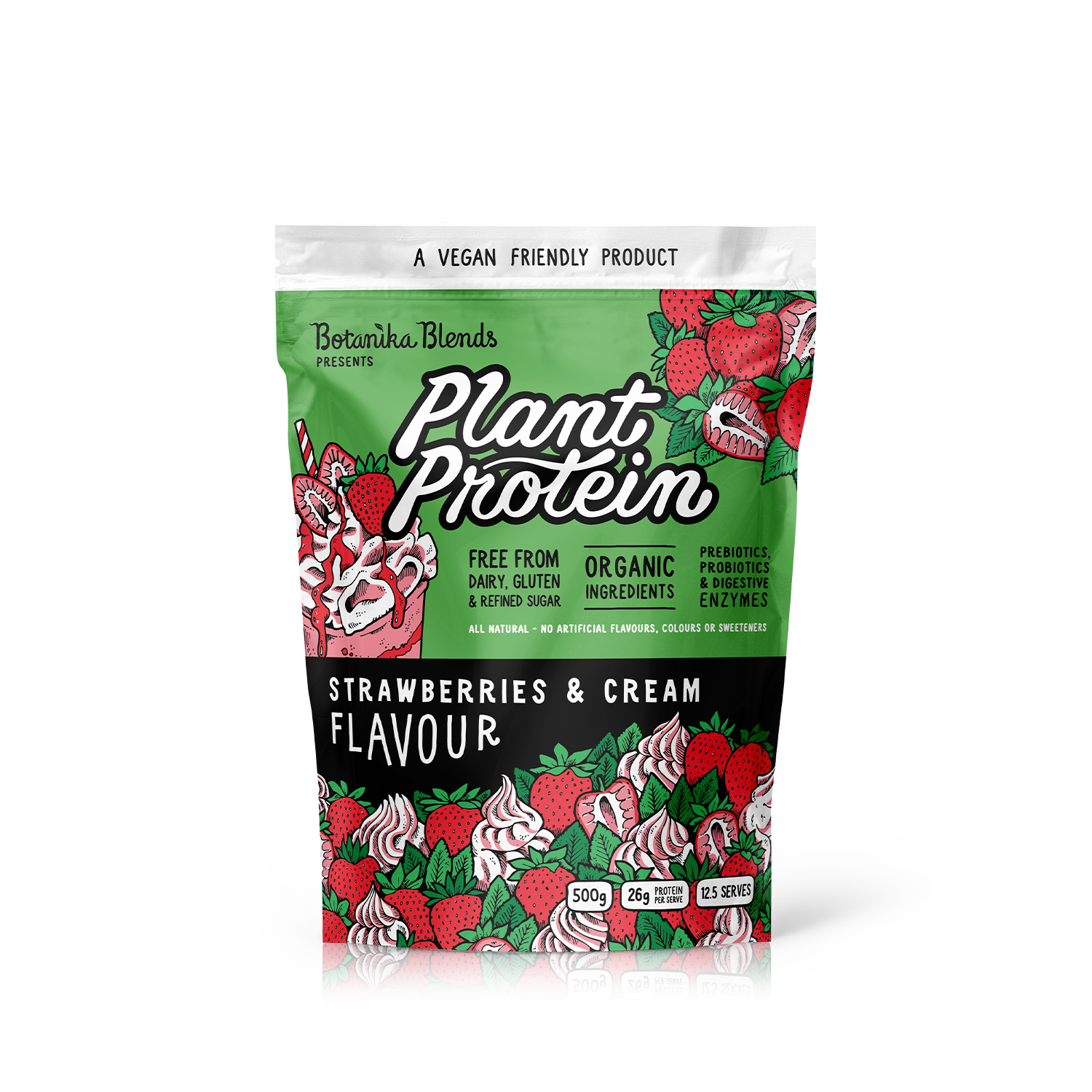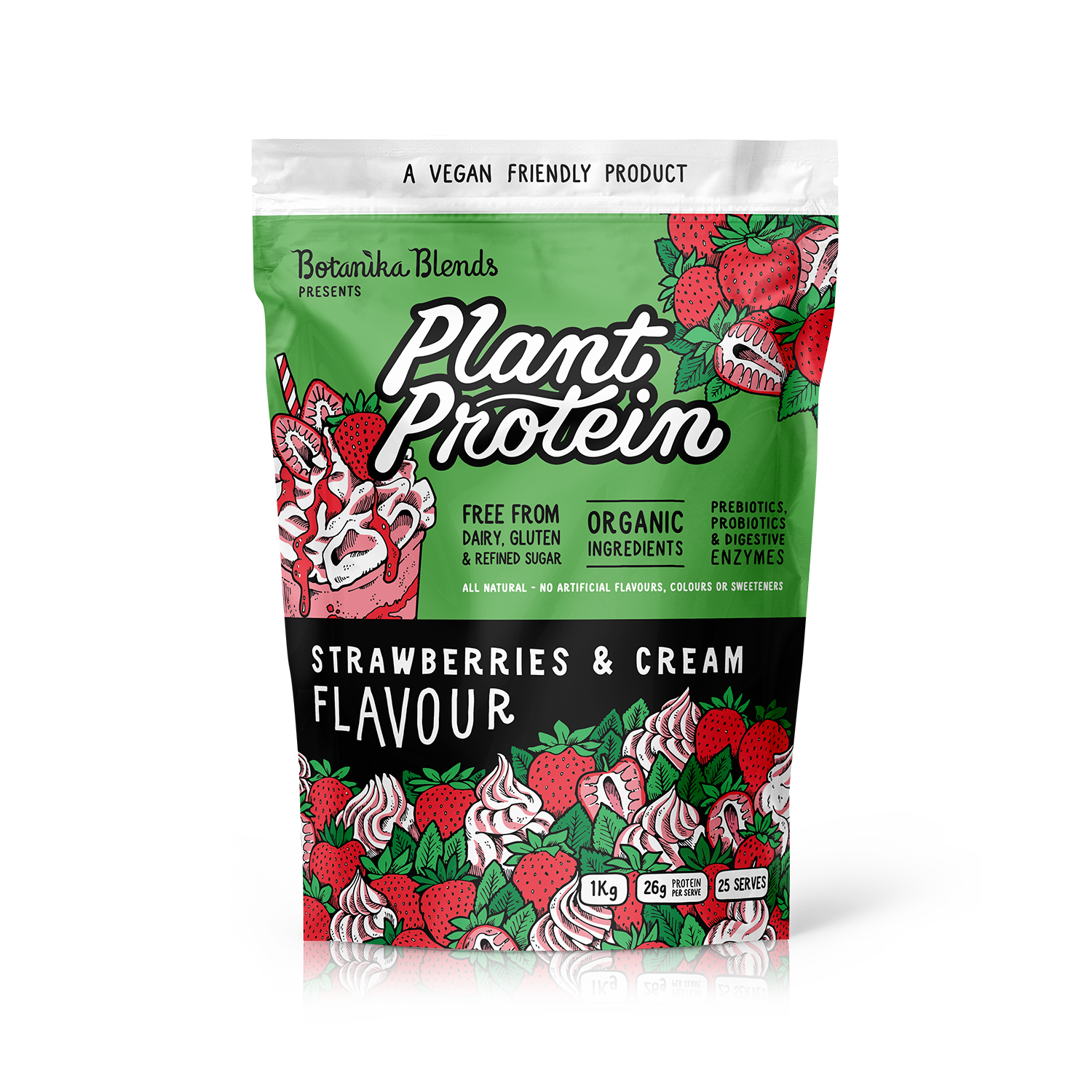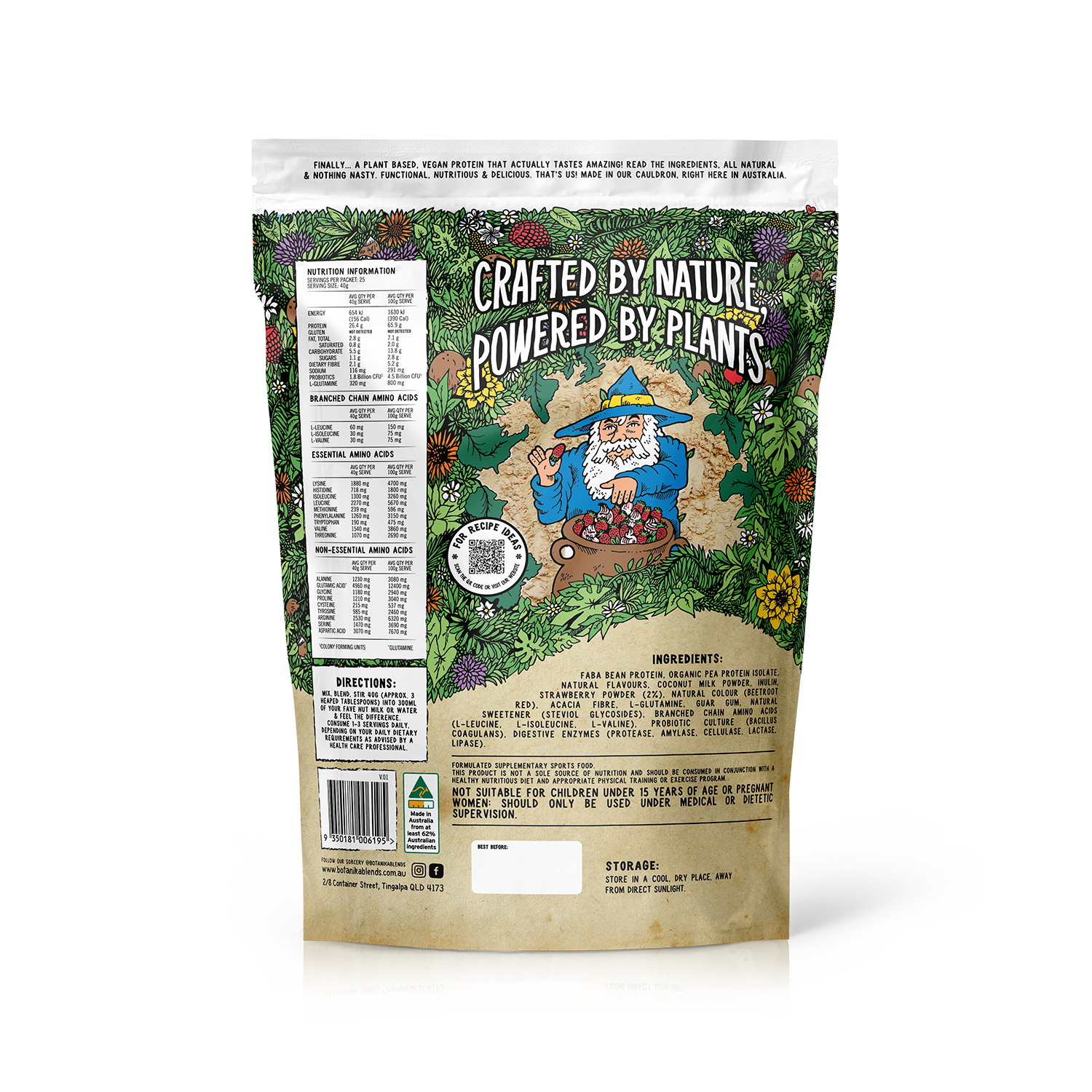Botanika Blends
Plant Protein - Strawberries & Cream
Plant Protein - Strawberries & Cream
Couldn't load pickup availability
Natural Strawberry Plant Protein (Faba + Pea Protein)
A delicious and creamy botanical protein blend, crafted for gut health and flavour. Made with real strawberry powder and naturally sweetened with stevia, this smooth, allergen-friendly formula is entirely plant-based and 100% free from nasties.
RRP PRICE = $49.95 (500g)
RRP PRICE = $74.95 (1kg)
__________________
Taste the Difference
Indulge in the lush taste of strawberries with a silky smooth texture, thanks to our blend of Faba Bean and Organic Pea Protein. Natural Strawberry Plant Protein is not just high in protein, it’s a gut-loving, clean formula designed for wellness-conscious consumers. Free from gluten, soy, dairy, and artificial additives, this is a nourishing elixir your customers will love adding to their daily routine.
Key Benefits:
🍓 High Protein – 26.4g of complete plant protein per serve
🌿 Gut-Friendly – Prebiotics, probiotics, and digestive enzymes
✔️ All-Natural – No artificial colours, flavours, or refined sugars
🪄 Smooth Texture – Thanks to faba bean’s natural creaminess
Additional Highlights:
✔️ Made in Australia with locally sourced faba beans
✔️ Vegan-friendly and allergy-friendly (free from soy, gluten, dairy, nuts)
✔️ Naturally sweetened with stevia, flavoured with real strawberry powder
✔️ No artificial anything – just pure, clean nutrition.
With a unique blend of gut-supportive ingredients, premium plant proteins, and real fruit flavour, this product delivers taste and function in every scoop. It’s the perfect option for health-focused customers seeking an allergen-free, delicious daily protein that supports digestion and vitality. Eye-catching, delicious, and genuinely clean.
Faba Bean Protein, Organic Pea Protein Isolate, Coconut Milk Powder, Inulin, Strawberry Powder (2%), Natural Beetroot Colour, Natural Sweetener (Stevia), Digestive Enzymes (Protease, Amylase, Cellulase, Lactase, Lipase), Probiotic (Bacillus Coagulans)
NUTRITIONAL INFORMATION
Serving Size: 40G
|
NUTRITION INFORMATION Serving size: 40g |
|
|
|
|
|
Average Quantity per Serve (40g Dry Mix) |
Average Quantity per 100g Dry Mix |
|
|
Energy |
654 kJ (156 Cal) |
1630 kJ (390 Cal) |
|
|
Protein - Gluten |
26.4 g Not Detected |
65.9 g Not Detected |
|
|
Fat, total |
2.8 g |
7.1 g |
|
|
- saturated |
0.8 g |
2.0 g |
|
|
Carbohydrate |
5.5 g |
13.8 g |
|
|
- sugars |
1.1 g |
2.8 g |
|
|
Dietary Fibre |
2.1 g |
5.2 g |
|
|
Sodium |
116 mg |
291 mg |
|
|
PROBIOTIC |
1.8 billion CFU1 |
4.5 billion CFU1 |
|
|
L-Glutamine |
320 mg |
800 mg |
|
|
¹Colony Forming Units |
|
|
|
|
BRANCHED CHAIN AMINO ACIDS |
|
|
|
|
L-Leucine |
60 mg |
150 mg |
|
|
L-Isoleucine |
30 mg |
75 mg |
|
|
L-Valine |
30 mg |
75 mg |
|
|
|
|
|
|
|
ESSENTIAL AMINO ACIDS |
|
|
|
|
Lysine |
1880 mg |
4700 mg |
|
|
Histidine |
718 mg |
1800 mg |
|
|
Isoleucine |
1300 mg |
3260 mg |
|
|
Leucine |
2270 mg |
5670 mg |
|
|
Methionine |
239 mg |
596 mg |
|
|
Phenylalanine |
1260 mg |
3150 mg |
|
|
Tryptophan |
190 mg |
475 mg |
|
|
Valine |
1540 mg |
3860 mg |
|
|
Threonine |
1070 mg |
2690 mg |
|
|
NON-ESSENTIAL AMINO ACIDS |
|
|
|
|
Alanine |
1230 mg |
3080 mg |
|
|
Glutamic acid* |
4960 mg |
12400 mg |
|
|
Glycine |
1180 mg |
2940 mg |
|
|
Proline |
1210 mg |
3040 mg |
|
|
Cysteine |
215 mg |
537 mg |
|
|
Tyrosine |
985 mg |
2460 mg |
|
|
Arginine |
2530 mg |
6320 mg |
|
|
Serine |
1470 mg |
3690 mg |
|
|
Aspartic acid |
3070 mg |
7670 mg |
|
|
*Glutamine |
|
|
|
*Glutamine
Made In Australia From Less Than 10% Australian Ingredients
Close package immediately after use. Store in a cool, dry place, away from direct sunlight
This product is not a sole source of nutrition and should be consumed in conjunction with a healthy nutritious diet and appropriate physical training or exercise program
Not suitable for children under the age of 15 years or pregnant women: should only be used under medical or dietetic supervision
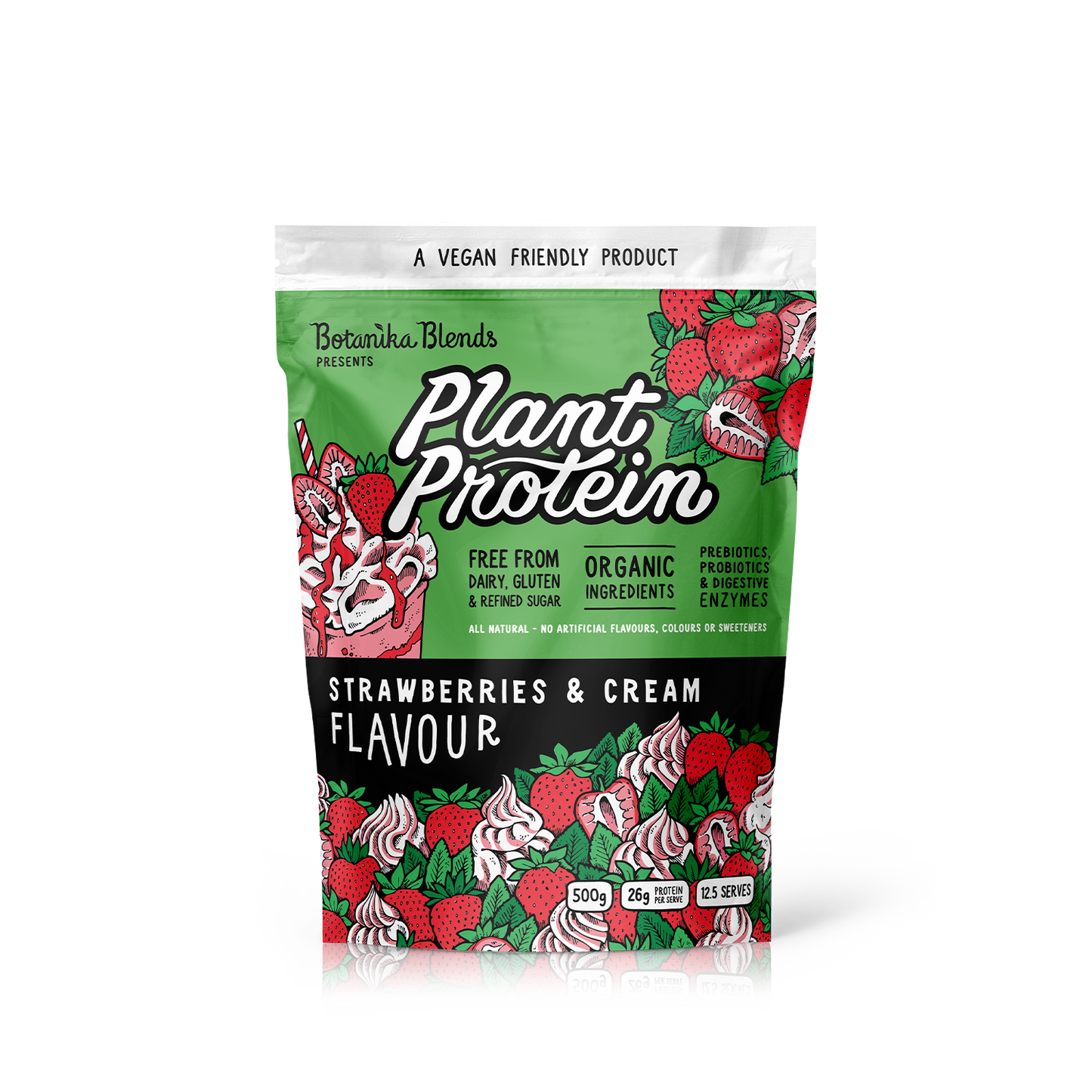
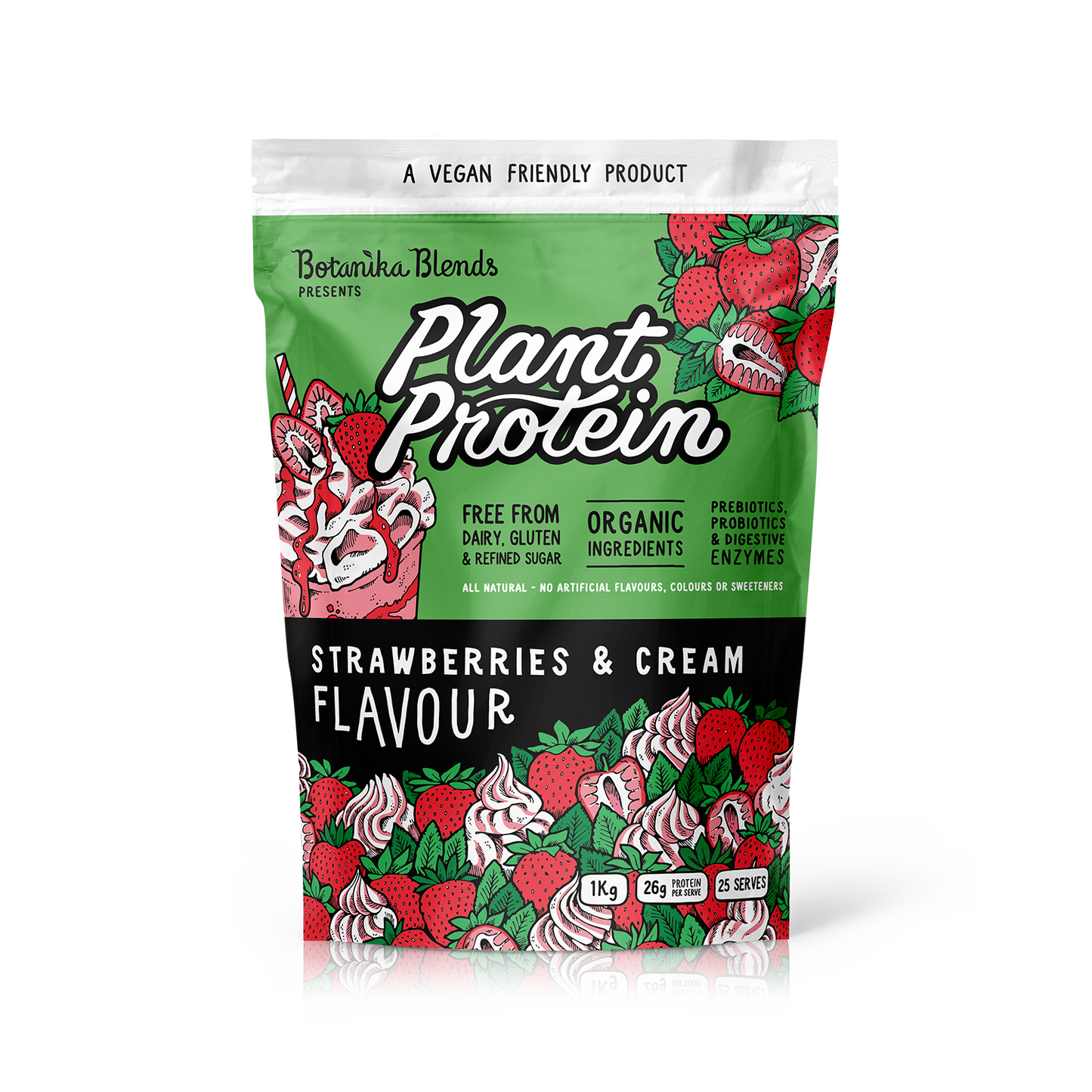
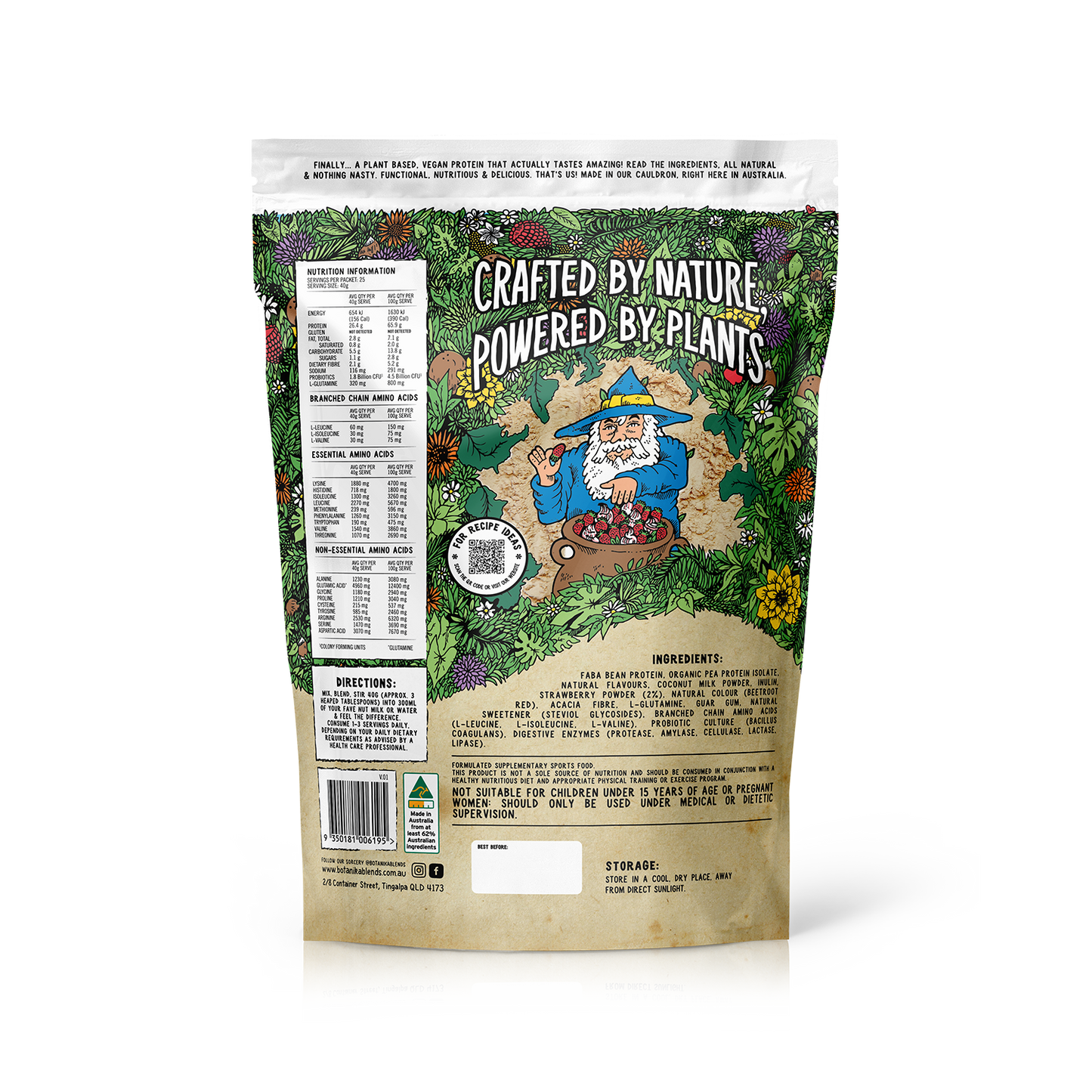
FAQ About Plant Protein
Blend Rice & Pea Protein
What is plant protein?
Plant protein is derived from various plant sources, such as peas, rice, hemp, soy, and quinoa. It is an alternative to animal-based proteins, commonly used by those following vegetarian, vegan, or plant-based diets. Plant proteins offer essential amino acids that support muscle growth, recovery, and overall health.
How is plant protein different from animal protein?
Plant protein is sourced exclusively from plants and is typically lower in fat and calories than animal protein. It is free from cholesterol and contains no lactose, making it suitable for those with lactose intolerance or dairy allergies. While animal proteins often contain all essential amino acids in one source, plant proteins may require combining different sources to achieve a complete amino acid profile.
What are the common sources of plant protein?
Common sources of plant protein include:
- Pea Protein: High in branched-chain amino acids (BCAAs), particularly beneficial for muscle recovery.
- Brown Rice Protein: Easily digestible and hypoallergenic, making it suitable for those with dietary restrictions.
- Hemp Protein: Rich in omega-3 and omega-6 fatty acids, supporting heart health.
- Soy Protein: One of the few complete plant proteins, offering all essential amino acids.
- Chia Seeds: Packed with fiber and omega-3 fatty acids, supporting overall health.
- Quinoa: Another complete protein, quinoa is also rich in fiber, vitamins, and minerals.
What is a complete protein, and can plant proteins be complete?
A complete protein contains all nine essential amino acids in adequate amounts. While some plant proteins, like soy and quinoa, are naturally complete, others may need to be combined to create a complete amino acid profile. For example, combining rice and pea protein can provide all the essential amino acids your body needs.
What are the benefits of taking plant protein?
lant protein offers numerous health benefits, including:
- Muscle Growth and Recovery: Provides the necessary amino acids for muscle repair and growth.
- Heart Health: Typically lower in saturated fat and cholesterol, and often rich in heart-healthy nutrients like fiber and antioxidants.
- Digestive Health: Many plant proteins are high in fiber, supporting better digestion.
- Weight Management: Plant proteins can promote satiety, helping to control hunger and reduce overall calorie intake.
How does plant protein support muscle growth?
Plant proteins provide essential amino acids required for muscle protein synthesis. While plant proteins may digest more slowly than animal proteins like whey, they can still effectively support muscle recovery and growth when consumed in sufficient quantities. Combining different plant protein sources can also ensure a balanced intake of all essential amino acids necessary for muscle development.
Can plant protein help with weight loss?
Yes, plant protein can be a valuable tool for weight loss. It helps promote satiety, making you feel full longer and reducing the likelihood of overeating. Additionally, plant proteins often contain fewer calories and fats compared to animal proteins, making them a leaner option for those looking to manage their weight.
When is the best time to take plant protein?
Plant protein can be taken at various times throughout the day, depending on your goals:
- Post-Workout: Consuming plant protein after exercise aids in muscle recovery.
- Between Meals: Taking plant protein between meals can help curb hunger and maintain energy levels.
- Meal Replacement: When combined with other nutrient-dense foods, plant protein can serve as a meal replacement for those seeking weight management or convenience.
How much plant protein should I take daily?
The recommended dosage of plant protein varies based on individual needs. Generally, 20-30 grams per serving is typical, but your exact requirements will depend on factors such as age, weight, activity level, and specific fitness goals. It's important to ensure you're getting enough protein throughout the day to support your overall health and fitness objectives.
Is plant protein safe for everyone?
Plant protein is generally safe for most individuals, including those with lactose intolerance, dairy allergies, or those following a vegan diet. However, it's essential to check the ingredient list, especially if you have allergies to specific plants like soy or nuts. Additionally, individuals with certain medical conditions should consult with a healthcare professional before incorporating any new supplements into their diet.
How does plant protein compare to whey protein?
Plant protein is an excellent alternative to whey protein, particularly for those avoiding dairy products. While whey protein is known for its rapid digestion and effectiveness in muscle recovery, plant protein offers a slower release of amino acids, which can be beneficial for sustained muscle repair. Plant proteins are also more environmentally sustainable and can be easier on the digestive system for some individuals.
Is plant protein better than animal protein for health?
Plant protein has certain health advantages over animal protein, including being lower in fat and calories, free from cholesterol, and often rich in fiber, antioxidants, and other nutrients that support heart and digestive health. However, both plant and animal proteins can be part of a balanced diet. The choice often depends on individual dietary preferences, ethical considerations, and specific health goals.
Is plant protein suitable for vegetarians and vegans?
Yes, plant protein is a perfect choice for vegetarians and vegans as it is entirely plant-based. It provides a valuable source of protein for those who do not consume animal products, helping to meet daily protein needs and support overall health.
Can people with gluten intolerance take plant protein?
Many plant proteins are naturally gluten-free, making them suitable for individuals with gluten intolerance or celiac disease. However, it's crucial to check the label for any potential cross-contamination or gluten-containing ingredients, especially if you are highly sensitive to gluten.
What should I look for when choosing a plant protein supplement?
When selecting a plant protein supplement, consider the following factors:
- Quality of Ingredients: Look for non-GMO, organic, and clean-label products.
- Amino Acid Profile: Ensure the supplement contains a complete amino acid profile or a blend of different plant proteins to achieve it.
- Additives: Choose a product with minimal additives, artificial flavors, and sweeteners.
- Digestibility: Opt for proteins that are easy to digest, such as pea or brown rice protein, especially if you have a sensitive stomach.
Can I mix plant protein with other supplements or foods?
Yes, plant protein is highly versatile and can be mixed with water, milk alternatives, or incorporated into smoothies. It's also a great addition to recipes like pancakes, muffins, or energy bars. Combining plant protein with other nutrient-dense foods, such as fruits and vegetables, can enhance the nutritional value of your meals and snacks.
Can plant protein replace meals?
Plant protein can serve as a meal replacement when combined with other nutrient-rich foods. For a balanced meal, consider adding healthy fats (e.g., nuts, seeds), complex carbohydrates (e.g., oats, sweet potatoes), and fiber-rich vegetables to your plant protein shake or smoothie. This will ensure you're getting a full spectrum of nutrients needed for sustained energy and overall well-being.

